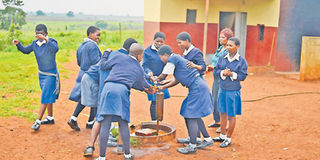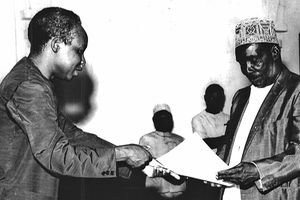Hand washing can save over 30,000 lives

What you need to know:
Juhudi Nyambuka a health officer with Water, Health, Education and Community Development (WAHECO), says that, it is also estimated that 12.6 per cent of children suffer from diarrheal diseases.
Do you know know that hand washing with clean and safe water plus soap before eating, and after visiting the toilet can prevent nearly 30,000 deaths in Tanzania annually due to diarrheal diseases?
Juhudi Nyambuka a health officer with Water, Health, Education and Community Development (WAHECO), says that, it is also estimated that 12.6 per cent of children suffer from diarrheal diseases.
She says that, handwashing is one of the best ways to protect yourself and your family from getting sick. It is important to wash hands before, during and after doing activities that leave our hands with germs.
According to Nyambuka, WAHECO has a number of schools included in their sanitation and hygiene programes to help young children grow up with the habit of handwashing.
Through the programme, they teach pupils on the procedures to follow when washing hands. And among other things they teach is what is the right time for washing hands.
“To avoid such diseases it is important to wash your hands before eating food, before , during and after preparing food, before and after caring for someone who is sick, and after treating a cut or wound, after using the toilet, changing diapers or cleaning up a child who has used the toilet, blowing your nose, coughing, or sneezing, touching an animal, animal feed, or animal waste and after touching garbage,” says Nyambuka.
According to www.cdc.gov, feaces (poo) from people or animals is a source of germs. A single gram of human feaces which is about the weight of a paper clip can contain one trillion germs.
Daudi Evarist,11, a grade V pupil at Kimanga Primary School says that at his school there is no access to clean water and soap on a daily basis. It makes it hard for the pupils to wash their hands whenever needed.
“It is not easy to get water daily at my school. When there is water there is no soap and I don’t even remember when was the last time I saw soap at school,”says Daudi.
Nyambuka says, the right way to wash your hands is first of all to wet hands with clean and running water, turn off the tap, appy soap. Run your hands together with soap, make sure you also reach the backs of your hands, under your nails and between fingers for 20 seconds. Rinse your hands well under clean and running water, the last procedure is to dry your hands using a clean towel or napkin.
Fatuma Musa, 12, a standard VI at Patmo Junior Nursery and Primary School says that, at the school there is access to water and soap however majority of the pupils don’t prioritize washing their hands.
She says that, majority wash their hands only before eating when the teacher is observing and the rest of the time they just buy things outside the school gate and eat without washing their hands.
Global Handwashing Day is an annual global advocacy day dedicated to increasing awareness and understanding about the importance of handwashing with soap as an easy, effective, and affordable way to prevent diseases and save lives.
Celebrated annually on October 15, Global Handwashing Day was founded by the Global Public-Private Partnership for Handwashing, and is an opportunity to design, test, and replicate creative ways to encourage people to wash their hands with soap at critical times. However, we should not wait until October to start practising the same. We should do it all the time.




